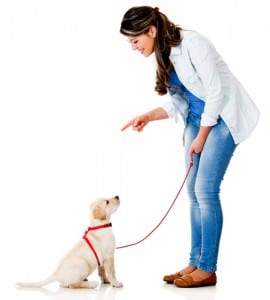Adopt, Don't Shop! Considering adding a new dog or cat to…
How to Potty Train a Dog

The Basics
Your best strategy is to confine your pet to areas where unsuccessful potty training attempts don’t cause too much damage. This should happen during times when you can’t supervise him and may involve leaving him in an indoor kennel or a special area penned off from the rest of the house. However, never shut him away from the family as this will only frighten him. It also needs to be a small area where he will not want to go pee. Do not leave him in a small enclosed area for a long period of time as this is simply cruel.
Take your dog outside first thing in the morning and wait for him to relieve himself. Praise him and give him a treat if he is successful. Take him inside for playtime and give him full access to a room, but only under your supervision. Bring him outside hourly to give him more opportunities to urinate. Write down when he went and what he did, so you can predict when he needs to go each day.
Important Points
- Ignore mistakes and reward your dog when he does the right thing and he will soon understand that going pee in the right manner will yield positive attention.
- Do not scold him for accidents, because he will only try and hide what he did and will be unwilling to go potty while you are watching.
- Placing him in an indoor kennel in your room at night allows him to let you know when he has to go and this can speed up the potty training process.
- Small puppies have small bladders and will need to be taken outside more often than adult dogs.
- If your dog has diarrhea and has to go frequently, try changing his food to see if that helps.
Accidents
In the event that your dog has an ‘accident’, be prepared. Clean the affected area with a solution that is four parts water to one part biological washing powder as this will remove stains and smells. Avoid cleaning products that use ammonia because this smells like urine to dogs and only encourages them to use the same spot time and again. Quietly lead away your dog to a safe area while you clean up the mess and don’t make a fuss of it!
Potty training a dog requires lots of patience but once you have achieved it, you and your pet will enjoy years of stress free living together!
Image license:
Woman training her dog – Shutterstock (view source)
